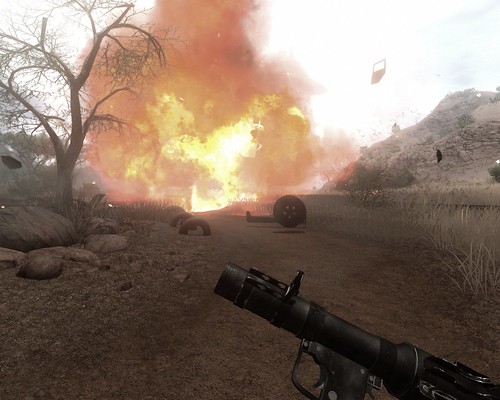
Reading L.B. Jeffries recent post about Videogames and Dreams kicked off a train of thought that I’ve been playing over and over in my head for a few weeks. L.B. takes some research about videogames and dreams along with some philosophy ideas based on Jungian archetypes and proposes that videogames represent something close to “a waking dream simulator”. The important part of the piece is where he mentions some theories and studies that suggest we can address “threatening situations” and deal with them in dreams. He says:
Gackenbach cites a theory by a fellow named Revonsuo who claims that dreams are a way for people to simulate threatening situations so they will be able to handle them should they literally occur.
And further…
What is happening when we play a video game is that we simply become accustomed to dealing with our nightmares. We enjoy this because we are naturally inclined to develop better skills for handling adrenaline, threats, and coping with fear in general.
While this doesn’t nearly do the piece justice (make sure to read it at some point) his mentioning of mastering nightmares reminded me of a piece I encountered while researching new applications of virtual reality technology as part of my honours coursework last year. The piece spoke of a VR program called ‘Virtual Iraq’ which was being used to treat returned servicemen that had been traumatized while serving in Iraq. The program recreated aspects of the incident and allowed the patient to recall the event and through slow and gradual re-exposure to the event with a counsellor eventually allowed them to master the highly traumatic memory.
L.B.’s post was also timely for me personally because at the time I had been re-reading a series of books that I had first read as a teenager and which have a profound impact on me each time I read them. I’d hazard a guess that most Australians of my generation have read at least some of the Tomorrow When the War Began series of books by the Australian author John Marsden, and frankly there’s a good reason they’re so popular. The books deal in a very compelling manner with themes of death, destruction, personal loss and the nihilism of war. Written from the first person they are acutely intimate in their dissection of the feelings and emotions that surround what happens to the protagonists as they repeatedly deal with nightmarish scenarios.
One of the things that the main protagonist Ellie describes in the story of the Tomorrow series is the psychological effects killing another person has on her. The following passage from the second book in the series, The Dead of the Night, describes Ellie’s feelings after shooting an enemy soldier in order to save her own life, and the life of her friends.
I was feeling pretty unusual, walking back across the paddocks. I imagined a huge shadow of me was moving across the sky, attached to me, and keeping pace with my little body on the earth. It scared me, really scared me, but I couldn’t escape it. It loomed over me, a silent dark creature growing out of my feet. I knew that if I reached out to feel it I would feel nothing. That’s the way shadows are. But all the same, the air around me seemed colder and darker, as the shadows clung to me. I wondered if this was the way my life would always be from now on, and if for every person I killed the shadow would grow larger, darker, more monstrous.
- From Chapter 5 of ‘The Dead of the Night’ by John Marsden.
The Tomorrow series succeeds in making me think about how I would react in similar circumstances and I’ve always strongly empathised with Ellie. In fact, I’ve always been fascinated by the extremes of existence – life, death, love and loss. Some people might be tempted to actively discourage the examination of such dark themes, arguing that they are ‘disturbing’ and morbid. But if L.B.’s discussion is right then there’s a very good reason that I am so (for lack of a better word) attracted to those sorts of things. Examining these things in advance, imagining myself in these situations could theoretically help prepare me for should these tragic things ever happen to me.
And while it’s clear no-one can really predict how they are going to react in horrific circumstances, I’ve always believed that when it really came down to it, I’d probably be able to do whatever I needed to. That in a crisis, I’d be someone reliable. A friend of mine who spent some time in the military once told me of a particularly traumatic event that occurred to him involving an attempted suicide of a fellow officer, in addition to the more general extreme mental and physical toughening regime he underwent during training, and when I mentioned that I didn’t think I could cut it, he disagreed with me. “Actually, you probably could”, was his opinion, and he wouldn’t back down. I didn’t realise it at the time, but eventually I came to understand that my reservations were less about being incapable more about not wanting to.
I think my aim in this is to explain (and perhaps justify) why I so highly value games, movies, books, media in general that presents the unsavoury or the unpleasant aspects of life. I enjoy it, like I enjoy trying on a new set of clothes to see how they fit, what they make me look like. I want to try these things on in a relatively safe way before they ever actually occur. I hesitate to call it this but; it seems the result is a kind of mental toughness or preparedness that you get by imagining yourself thrust into the same position as someone in a war or a terrible circumstance. Indeed it is often the people who want to reject the unpleasant, who pretend that life is all smiles, that are overwhelmed when thrown into nightmarish circumstances.
The commonly accepted wisdom is that games have to be ‘fun’ or people will stop playing. In light of the previous discussion, how well does that idea sit? I’d say it starts to look rather ridiculous, certainly other media have no such misconceptions. There are lots of examples in film and novels that show they are capable of holding an audiences interest without being ‘fun’. Saving Private Ryan is not ‘fun’. Tomorrow When he War Began is not ‘fun’. Far Cry 2 is not fun. …but it also kind of is at the same time. Certainly the act of shooting, of moving and being in the world are ‘fun’ in the sense that they are pleasurable acts. But there is no escaping the fact that everything you do, if you aren’t caught up in the ‘fun’ of doing it, is distinctly UN-fun.
I think that’s partly why I like it so much – because it’s not fun. What other games out there have the guts to say to the player, “You know what? You are going to have to do and see and hear about shitty things, and you’re not going to like them but you’ll have a bloody good time while you’re doing it”? So maybe the lesson is, give players a good time, and they'll accept negativity. Honestly, I'm not entirely sure, and while Randy Balma did wonders to convince me that even game mechanics don't have to be pleasurable, I find plenty to enjoy in that game in spite of it's deliberate attempts otherwise.
I’ll finish with another quote from the last book in the Tomorrow series, ‘The Other Side of Dawn’, that seems to sum up my own feelings.
The old stories used to end with ‘They all lived happily ever after’. And you’d often hear parents saying: ‘I just want my kids to be happy.’
That’s crap, if you ask me. Life’s about a hell of a lot more than being happy. It’s about feeling the full range of stuff: happiness, sadness, anger, grief, love, hate. If you try to shut one of those off, you shut them all off. I don’t want to be happy. I know I won’t live happily ever after. I want more than that, something richer. I want to go right up close to the beauty and the ugliness. I want to see it all, know it all, understand it all. The richness and the poverty, the joy and the cruelty, the sweetness and the sadness. …That’s the best way I can lead a life I can be proud to call my own. I want to experience everything it has to offer: LIFE!
- From the epilogue of ‘The Other Side of Dawn’ by John Marsden.


3 comments:
Lovely response to L.B.’s post…
I’m definitely going to have to check out this Tomorrow series when I come across some money, it sounds interesting.
Anyway, I actually planned on stroking this similar topic in a future entry of mine. I honestly don’t think it’s as common knowledge as most people in “our subculture” would assume it to be (referring the general perception of video-games as “fun”). I do think games are gradually expanding in the direction where more of this stuff is can evolve. However, I’m interested to see how the generations below us will come to grasp these games that they’re growing up with now, because they’re going to have a greater impact on it’s future than most of us will eventually…
~sLs~
I need a game to help me deal with Monday mornings and relationships turning sour....
It's interesting that you think you'd be more prepared for things like war by reading, watching, listening and playing. My initial reaction is to disagree. As a result of media relating to experiences in war, it seems to me like it would be such a challenge as to be almost insurmountable. It almost makes me want to join up but I'm too shit scared of dying! Probably a healthy thing... lol
Robin - I totally understand where you're coming from, and I agree! Once when I was in the grip of a long time Battlefield 2 addiction I had a dream that I was in a war for real and being shot at. It totally freaked me out for a couple of days and the thought of playing Battlefield made me sick.
So it makes me really scared, and obviously I would never in a million years want to have to be involved in a war, but if worst came to worst, at least I guess now I kind of know myself a bit better. Hopefully I'd be able to predict how I'd respond a bit better.
But hey, like I said, we can't really know for sure how we'd react. But better to have a vague idea than none at all and be overwhelmed.
SLS - Definitely check the books out, they were finished in the late 90's so they should all be available in cheap paperbacks. I don't think they were ever a huge hit in the US like they were in Australia, but they were at least published there. For some reason they were apparently really popular in Sweden and Germany though!! =P
Post a Comment